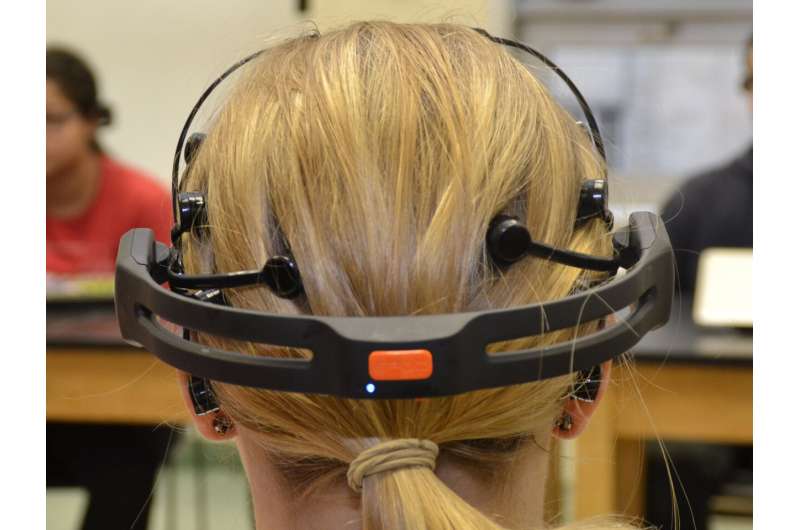This article has been reviewed according to Science X's editorial process and policies. Editors have highlighted the following attributes while ensuring the content's credibility:
fact-checked
peer-reviewed publication
trusted source
proofread
In sync brainwaves predict learning, study shows

Students whose brainwaves are more in sync with their classmates and teacher are likely to learn better than those lacking this "brain-to-brain synchrony," shows a new study by a team of psychology and education researchers. The findings, which appear in the journal Psychological Science, offer new insights into the learning process.
"This is the first study to show that the extent to which students' and teachers' brainwaves are in sync during real-world learning can predict how well students retain information from class," says lead author Ido Davidesco, an assistant professor at the University of Connecticut's Neag School of Education and a former postdoctoral fellow at New York University, where the study was conducted.
"Much of human learning happens when we interact with others, but very little is known about how this process is reflected in the brain activity of students and teachers," adds Suzanne Dikker, a research professor at NYU's Department of Psychology and one of the paper's senior authors. "This work reveals that students whose brainwaves are more in sync with their peers and teacher are likely to learn better."
Our understanding of how the brain supports learning in a social setting is limited because learning is typically studied in individual participants in controlled laboratory settings. In the Psychological Science paper, the team sought to study brain function in a real-world, group context.
To do so, the researchers used electroencephalography (EEG), a commonly used method where a cap with electrodes is placed on the head. This method allowed the researchers to track the electrical brain activity of small groups of undergraduate students and an instructor—none of the participants knew each other prior to the study.
In these sessions, the instructors gave short lectures on a variety of scientific topics; during the lecture period, both the students' and the instructors' brainwaves were monitored.
Afterwards, students took multiple-choice tests to gauge what they had learned.
The researchers found that as students were listening to the lecture, their brainwaves became in sync with one another. Moreover, the researchers observed such "brain-to-brain synchrony"—similar brain-activity patterns over time—between the students' brainwaves and when comparing students' brainwaves to the teacher's brainwaves.
Critically, students whose brain activity was more in sync with their peers and with the teacher learned better—as shown in higher post-lecture test scores. In fact, the researchers were able to effectively predict which test questions students would answer correctly based on how in sync their brainwaves were during the moments of the lecture that corresponded to each question.
The authors emphasize that it's the connection among students and to their instructor that is telling about the learning process. In fact, the researchers could not derive how well students retained information from looking at individual students' brainwaves—only synchrony in brainwaves between students and teachers predicted how well students learned.
"Brain data collected simultaneously from groups of students can be more informative than data collected from individual students," Davidesco observes.
More information: The Temporal Dynamics of Brain-to-Brain Synchrony Between Students and Teachers Predict Learning Outcomes, Psychological Science (2023). DOI: 10.1177/09567976231163872
Journal information: Psychological Science
Provided by New York University





















